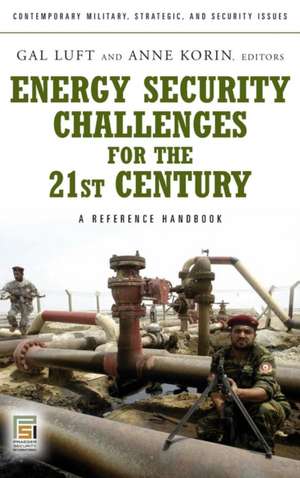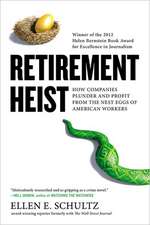Energy Security Challenges for the 21st Century: A Reference Handbook: Contemporary Military, Strategic, and Security Issues
Editat de Gal Luft, Anne Korinen Limba Engleză Hardback – 9 aug 2009 – vârsta până la 17 ani
Din seria Contemporary Military, Strategic, and Security Issues
- 19%
 Preț: 362.88 lei
Preț: 362.88 lei - 18%
 Preț: 301.15 lei
Preț: 301.15 lei - 8%
 Preț: 349.67 lei
Preț: 349.67 lei - 27%
 Preț: 364.15 lei
Preț: 364.15 lei - 18%
 Preț: 320.42 lei
Preț: 320.42 lei - 27%
 Preț: 439.09 lei
Preț: 439.09 lei - 27%
 Preț: 346.07 lei
Preț: 346.07 lei - 24%
 Preț: 327.59 lei
Preț: 327.59 lei - 27%
 Preț: 345.42 lei
Preț: 345.42 lei - 27%
 Preț: 344.90 lei
Preț: 344.90 lei - 27%
 Preț: 364.06 lei
Preț: 364.06 lei - 14%
 Preț: 322.02 lei
Preț: 322.02 lei - 24%
 Preț: 363.98 lei
Preț: 363.98 lei - 24%
 Preț: 363.29 lei
Preț: 363.29 lei - 18%
 Preț: 300.68 lei
Preț: 300.68 lei - 27%
 Preț: 346.67 lei
Preț: 346.67 lei - 33%
 Preț: 371.40 lei
Preț: 371.40 lei - 28%
 Preț: 436.15 lei
Preț: 436.15 lei - 28%
 Preț: 436.99 lei
Preț: 436.99 lei - 24%
 Preț: 363.56 lei
Preț: 363.56 lei - 21%
 Preț: 241.95 lei
Preț: 241.95 lei - 14%
 Preț: 350.16 lei
Preț: 350.16 lei - 18%
 Preț: 337.97 lei
Preț: 337.97 lei - 18%
 Preț: 302.10 lei
Preț: 302.10 lei - 27%
 Preț: 379.45 lei
Preț: 379.45 lei - 27%
 Preț: 364.40 lei
Preț: 364.40 lei - 18%
 Preț: 301.15 lei
Preț: 301.15 lei - 24%
 Preț: 462.45 lei
Preț: 462.45 lei - 36%
 Preț: 206.82 lei
Preț: 206.82 lei - 14%
 Preț: 336.57 lei
Preț: 336.57 lei - 14%
 Preț: 349.30 lei
Preț: 349.30 lei - 14%
 Preț: 337.50 lei
Preț: 337.50 lei
Preț: 363.15 lei
Preț vechi: 443.68 lei
-18% Nou
Puncte Express: 545
Preț estimativ în valută:
69.50€ • 72.37$ • 58.74£
69.50€ • 72.37$ • 58.74£
Carte disponibilă
Livrare economică 17 februarie-03 martie
Preluare comenzi: 021 569.72.76
Specificații
ISBN-13: 9780275999971
ISBN-10: 0275999971
Pagini: 388
Dimensiuni: 156 x 235 x 31 mm
Greutate: 0.74 kg
Editura: Bloomsbury Publishing
Colecția Praeger
Seria Contemporary Military, Strategic, and Security Issues
Locul publicării:New York, United States
ISBN-10: 0275999971
Pagini: 388
Dimensiuni: 156 x 235 x 31 mm
Greutate: 0.74 kg
Editura: Bloomsbury Publishing
Colecția Praeger
Seria Contemporary Military, Strategic, and Security Issues
Locul publicării:New York, United States
Notă biografică
GAL LUFT and ANNE KORIN are co-directors of the Institute for the Analysis of Global Security (IAGS) a Washington based think tank focused on energy security. They specialize in strategy, geopolitics, terrorism, energy security and economic warfare. They have published numerous studies and articles on security and energy issues in various newspapers and publications, testified before congressional committees and advised think tanks and news organizations worldwide.
Cuprins
PrefaceAbbreviationsChapter 1 Energy Security: In the Eyes of the BeholderGal Luft and Anne KorinChapter 2 The Epidemic of Energy TerrorismAli M. KoknarChapter 3 Troubled Waters: Energy Security as Maritime SecurityDonna J. NincicChapter 4 There Will Be Blood: Political Violence, Regional Warfare, and the Risk of Great-Power Conflict over Contested Energy SourcesMichael T. KlareChapter 5 No Blood for Oil: Why Resource Wars Are ObsoleteChristopher J. FettweisChapter 6 OPEC: An Anatomy of a CartelAmy Myers JaffeChapter 7 Russia: The Flawed Energy SuperpowerAriel CohenChapter 8 Energy Security in the Caspian BasinAriel CohenChapter 9 Latin America: America's Forgotten Energy BarnJohanna Mendelson Forman and Susana MoreiraChapter 10 United States: A Shackled SuperpowerGal LuftChapter 11 The European Union: On Energy, DisunityKevin RosnerChapter 12 Japan: The Power of EfficiencyDevin StewartChapter 13 Jia You! (Add Oil!): Chinese Energy Security StrategySabrina HowellChapter 14 India: Addicted to CoalJeremy CarlChapter 15 Squaring the U.S.-Africa-China Energy Triangle: The Path from Competition to CooperationDavid L. GoldwynChapter 16 Turkey: A Case of a Transit StateNecdet PamirChapter 17 NATO's Grapple with Energy SecurityRobert G. BellChapter 18 Liquefied Natural Gas: The Next Prize?Cindy HurstChapter 19 Technological Solutions for Energy SecurityPaul J. WerbosChapter 20 A Nuclear Renaissance?Charles D. FergusonChapter 21 The Decentralized Energy ParadigmDavid M. SweetChapter 22 Balancing Energy Security and the EnvironmentDeron LovaasChapter 23 Realism and Idealism in the Energy Security DebateGal Luft and Anne KorinIndex
Recenzii
Editors Luft and Korin (Institute for the Analysis of Global Security) and 20 co-contributors offer a timely and comprehensive look at the role of energy in modern life and the different approaches countries employ to maintain energy security. The overview of the energy system also examines the growing concern over its vulnerabilities. Essentially, the book provides a debate regarding resource conflicts and control by covering issues such as terrorism, maritime security, the role of multinationals in energy security, security through diversification of sources, and development of alternative energy. It also explores the tradeoffs inherent in domestic and foreign policy required to maintain a safe, affordable energy supply.
The book sets out to give the reader a bird's eye view of the world's energy system and its vulnerabilities, and it delivers. Chapters are well structured and to the point. A sense of common purpose and structure is maintained throughout the book, also when authors argue different points and in different ways..This book gives energy security the attention it deserves: right in the middle of international politics.
. . . offers compelling evidence about the scope of energy security as it is perceived by countries and organizations. . . . This book offers plenty of information--covering piracy/terrorism, Russia, Europe, and the US--will give readers a sense of the control to be exerted by those who control energy resources. . . Recommended. Lower-level undergraduates and above; general readers.
This should be part of any college-level military or social issues collection.
The book sets out to give the reader a bird's eye view of the world's energy system and its vulnerabilities, and it delivers. Chapters are well structured and to the point. A sense of common purpose and structure is maintained throughout the book, also when authors argue different points and in different ways..This book gives energy security the attention it deserves: right in the middle of international politics.
. . . offers compelling evidence about the scope of energy security as it is perceived by countries and organizations. . . . This book offers plenty of information--covering piracy/terrorism, Russia, Europe, and the US--will give readers a sense of the control to be exerted by those who control energy resources. . . Recommended. Lower-level undergraduates and above; general readers.
This should be part of any college-level military or social issues collection.














